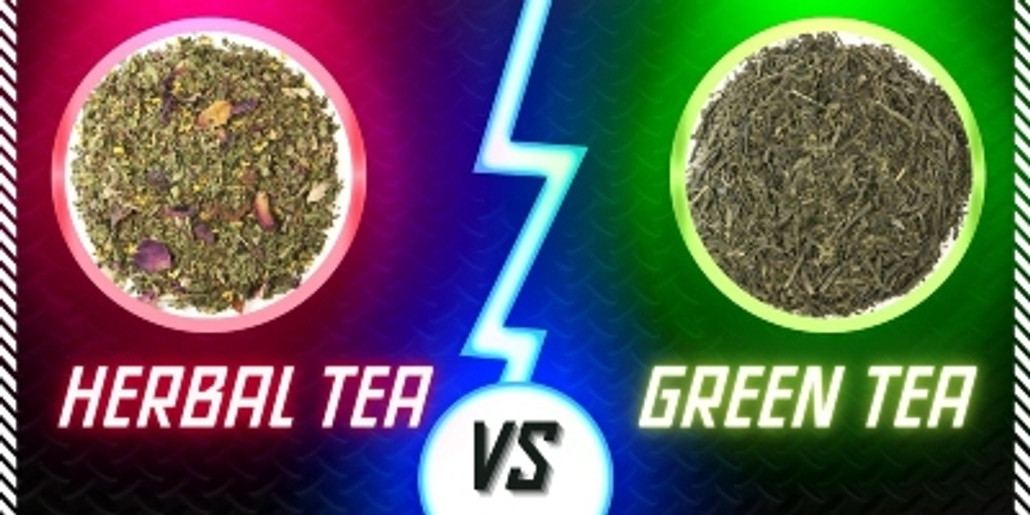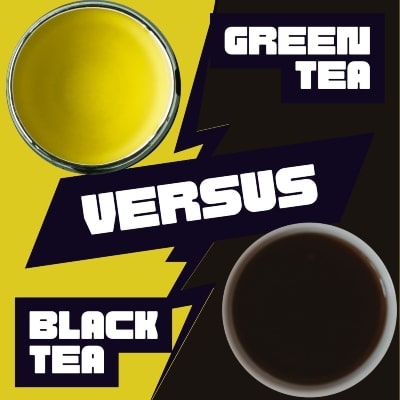Posted by Jeffrey Chipson on Feb 24th 2023
Herbal Tea vs Green Tea: Which One For You?
Are you curious about the differences between green tea and herbal tea? This article will provide a comprehensive comparison of green tea and herbal tea, so that you can make an informed decision on which one is the best choice for you.
Introduction to Green Tea and Herbal Tea
Green tea and herbal tea, while both being types of tea, have some major differences. Green tea is made by steaming and pan-frying the leaves of a plant called Camellia sinensis, while herbal tea is made from the infusion of herbs, spices, fruits, or other plant material in boiling water. Green tea is known for its many health benefits, while herbal tea has a variety of flavors and is often used for its medicinal properties.
In this article, we will explore the health benefits, taste, flavor, caffeine content, cost, preparation methods, popular varieties, and disadvantages of green tea and herbal tea.
Health Benefits of Green Tea and Herbal Tea
Green tea and herbal tea both provide numerous health benefits. Green tea is packed with antioxidants and has shown to improve heart health, reduce stress, and may even help with weight loss. It is also known to boost brain function and has even been studied for its potential cancer-fighting properties. Herbal tea, on the other hand, is known to aid in digestion, reduce inflammation, and soothe the mind. It is also known to be good for the heart, reduce stress, and has been used as an effective remedy for a variety of ailments.
In addition to providing health benefits, both green tea and herbal tea can help to hydrate the body. By drinking these types of tea, you can get the benefits of both hydration and health benefits.
Taste and Flavor Comparison
Green tea and herbal tea are two popular beverages that offer distinct flavor profiles. While both teas are brewed with hot water, the taste and flavor can vary greatly depending on the type of tea and the herbs used. Green tea, for instance, is known for its mildly bitter and earthy flavor. The grassy and smoky undertones of green tea can also be detected, which some people may find too strong or overpowering.
Despite its bitter notes, green tea can be an acquired taste for many people, and the complexity of its flavor is what makes it a popular choice for tea enthusiasts. The bitterness of green tea can be balanced with other ingredients such as honey, which can enhance its sweetness, or lemon, which can provide a zesty and refreshing twist.
In contrast, herbal tea is typically sweeter and milder in flavor compared to green tea. The variety of herbs used in herbal tea can result in a diverse range of flavors, from fruity and floral to spicy and tart. Depending on the herbs used, herbal tea can also have a soothing or calming effect, making it a popular choice for relaxation and wellness purposes.
One of the great things about herbal tea is its versatility. Some of the most popular herbal teas include chamomile, peppermint, and ginger, which are known for their calming, refreshing, and digestive properties. The floral notes of chamomile, the cooling properties of peppermint, and the spiciness of ginger can provide a unique flavor experience that is different from other tea types.
The taste and flavor of green tea and herbal tea can vary greatly depending on the type of tea and the herbs used. Green tea tends to be more bitter, with smoky and earthy undertones, while herbal tea is often sweeter and more diverse in flavor. Regardless of personal taste preferences, both types of tea offer a range of benefits and can be enjoyed for their unique and distinct flavor profiles.
Caffeine Content Comparison
Green tea and herbal tea are two popular beverages that offer different benefits due to their caffeine content. Green tea contains caffeine, while herbal tea is naturally caffeine-free. The amount of caffeine in green tea can vary depending on the variety of tea and how it is prepared. On average, green tea contains between 30-50 mg of caffeine per cup, which is lower than coffee but can still provide an energy boost.
The caffeine content of green tea can be beneficial in providing an energy boost for those who need it. However, for those who are sensitive to caffeine, green tea may not be the best choice. The effects of caffeine can vary depending on the individual, but for some, it can lead to feelings of anxiety, jitters, and restlessness. In these cases, herbal tea is a great alternative since it is naturally caffeine-free and won't cause the same effects.
Herbal tea is a popular choice for those who want to avoid caffeine altogether, or for those who want to relax and unwind. The lack of caffeine in herbal tea can have a calming effect, making it a great choice for people who want to wind down after a long day. Additionally, herbal tea is a great option for people who have trouble sleeping since caffeine can disrupt sleep patterns.
Green tea and herbal tea offer different benefits due to their caffeine content. Green tea contains caffeine, which can provide an energy boost, but can also be a drawback for those who are sensitive to caffeine. Herbal tea is naturally caffeine-free, making it a great choice for those who want to avoid caffeine or want to relax and unwind. Regardless of personal taste preferences, both types of tea offer a range of benefits and can be enjoyed for their unique qualities.
Cost Comparison
When it comes to purchasing green tea or herbal tea, the cost can vary widely depending on several factors. Generally, green tea tends to be more expensive than herbal tea, due to the specific type of plant it is made from. On average, a box of green tea can range from $1 to $4, while a box of herbal tea can range from $2 to $6.
However, the cost of green tea and herbal tea can also depend on the quality of the tea and the ingredients used. Premium green tea, for example, can cost more than regular green tea due to its higher quality and flavor profile. Similarly, some herbal teas can be more expensive due to the use of rare or exotic ingredients that are more costly to source.
When considering the cost of green tea and herbal tea, it's important to keep in mind that the price may reflect the quality and flavor profile of the tea. While cheaper options are available, they may not offer the same taste or health benefits as more expensive varieties. Additionally, it's worth considering the quantity of tea in each box and the number of cups each box can make. Higher-priced teas may provide more tea leaves or tea bags per box, making them a better value in the long run.
The cost of green tea and herbal tea can vary greatly depending on several factors, including the type of tea, quality of the tea, and ingredients used. Generally, green tea is more expensive than herbal tea, but higher-priced options may offer better flavor and health benefits. When purchasing tea, it's important to consider the value of the tea in terms of quality and quantity, as well as personal taste preferences.
Preparation Methods Comparison
Preparing green tea and herbal tea involves different methods and techniques, each requiring careful attention to detail in order to achieve the desired flavor and health benefits.
Green tea is typically prepared by steeping the tea leaves in hot water for a few minutes. The exact amount of time needed to steep the tea can vary depending on the variety and strength of the tea. Typically, green tea should be steeped for 2-3 minutes in water that is between 160-180°F. It's important to avoid using boiling water for green tea, as this can cause the tea to become bitter and astringent.
Herbal tea, on the other hand, is typically prepared by steeping herbs in hot water for a few minutes. The steeping time can vary depending on the type of herbs used and the desired strength of the tea. Typically, herbal tea should be steeped for 5-10 minutes in water that is between 175-185°F. It's important to note that some herbs may require a longer steeping time in order to release their full flavor and health benefits.
When preparing green tea and herbal tea, it's important to use high-quality ingredients and the appropriate water temperature to ensure the best taste and health benefits. Additionally, using a tea infuser or strainer can help to prevent any leaves or herbs from floating in the tea.
In summary, the preparation methods for green tea and herbal tea can vary greatly, with each requiring careful attention to detail in order to achieve the desired flavor and health benefits. Green tea is typically prepared by steeping the leaves in water that is between 160-180°F for 2-3 minutes, while herbal tea is typically prepared by steeping herbs in water that is between 175-185°F for 5-10 minutes. By following these guidelines, tea lovers can enjoy a delicious and healthful cup of tea every time.
Popular Varieties of Green Tea and Herbal Tea
Green tea and herbal tea come in a variety of types and flavors. Popular varieties of green tea include matcha, sencha, gyokuro, and bancha. Popular varieties of herbal tea include chamomile, peppermint, rooibos, and hibiscus.
Green tea and herbal tea can also be blended with other ingredients to create unique and flavorful teas. For example, green tea can be blended with fruit or flowers to create a fruity or floral tea, while herbal tea can be blended with spices and herbs to create a spicy or earthy tea.
Disadvantages of Green Tea and Herbal Tea
When it comes to health benefits, both green tea and herbal tea offer a variety of advantages, but they also have some potential drawbacks to consider. As mentioned before, green tea contains caffeine, which can cause side effects such as headaches, insomnia, and irritability for some individuals. On the other hand, herbal tea can have side effects such as an upset stomach or an allergic reaction, depending on the specific herbs used.
Both types of tea can also be high in tannins, which can cause a bitter taste and interfere with the absorption of certain nutrients. However, tannins also have some health benefits, such as their antioxidant properties, so it's important to consume them in moderation.
It's also worth noting that green tea and some herbal teas may interact with certain medications, so it's important to consult with a healthcare professional before consuming large amounts of these teas. Overall, while green tea and herbal tea can provide a range of health benefits, it's important to be aware of their potential drawbacks and to consume them in moderation.
Tips for Enjoying Green Tea and Herbal Tea
When it comes to getting the most out of your green tea or herbal tea, there are a few key tips to keep in mind. First and foremost, it is essential to use the correct steeping method and temperature for the type of tea you are brewing. This will allow the tea to steep properly and ensure that you get the full flavor and health benefits of the tea. It's worth noting that the steeping time and temperature may vary depending on the specific type of tea you are using, so it's important to consult the instructions on the packaging or do some research before brewing.
In addition to using the proper steeping method, it's important to be mindful of how much tea you are consuming. While tea is generally considered a healthy beverage, consuming too much of it can lead to unwanted side effects such as headaches and insomnia, particularly if the tea contains caffeine.
Finally, don't be afraid to experiment with different types of tea to find the one that best suits your taste and needs. There are countless varieties of green tea and herbal tea available, each with its own unique flavor profile and health benefits. By trying out different teas, you can discover new favorites and reap the maximum benefits of these healthful and delicious beverages.
Conclusion
Green tea and herbal tea are both fantastic options for those seeking a change from coffee or for those who enjoy a diverse range of flavors. Green tea is chock-full of antioxidants and offers a plethora of health advantages, while herbal tea provides a broad range of flavors and can be enjoyed for its medicinal properties. When it comes to health advantages, taste, flavor, caffeine content, cost, preparation methods, and popular varieties, green tea and herbal tea have their respective advantages and disadvantages.
To get the most out of your green tea or herbal tea, it is essential to use the proper steeping method, temperature, and amount. Sampling different types of tea can help you find the one that best fits your preferences and requirements.
If you're simply interested in understanding the differences between green tea and herbal tea, this article delivers a comprehensive comparison of the two. Hopefully, it has provided you with the necessary information to make an educated decision on which one is the most appropriate for you.


